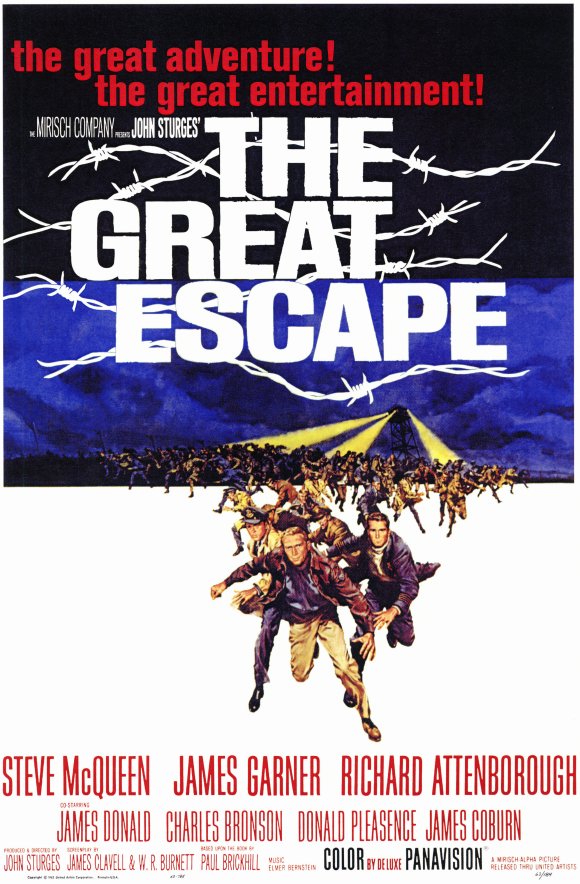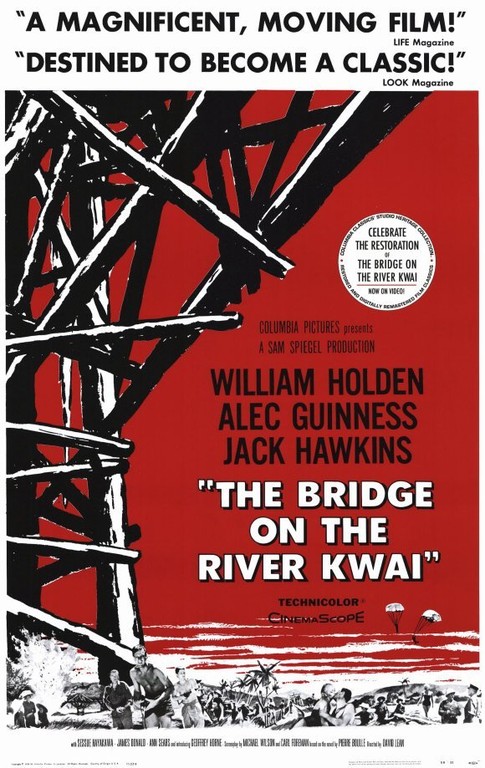The Great Escape
 After putting together a super team for the exciting western The Magnificent Seven, director John Sturges assembled the rat-pack for the much duller western, Sergeants 3; so down but not out, Sturges reconvened some of his Magnificent Seven cast for his masterpiece, the WWII POW epic The Great Escape. With apologies to King Rat, Merry Christmas, Mr. Lawrence, Empire of the Sun, The Hill, and even Victory, the official, no- arguments-allowed Big Three of POW flicks are (in order of release): Stalag 17 then The Bridge on the River Kwai, and finally The Great Escape; you can argue which of the Big Three is tops, but all three are wonderful and will rank in any war movie best-of list.
After putting together a super team for the exciting western The Magnificent Seven, director John Sturges assembled the rat-pack for the much duller western, Sergeants 3; so down but not out, Sturges reconvened some of his Magnificent Seven cast for his masterpiece, the WWII POW epic The Great Escape. With apologies to King Rat, Merry Christmas, Mr. Lawrence, Empire of the Sun, The Hill, and even Victory, the official, no- arguments-allowed Big Three of POW flicks are (in order of release): Stalag 17 then The Bridge on the River Kwai, and finally The Great Escape; you can argue which of the Big Three is tops, but all three are wonderful and will rank in any war movie best-of list.
Like the recent action flicks The Expendables or The Avengers, The Great Escape is about assembling the team of super cool (now familiar) faces. The Magnificent Seven put the young supporting Steve McQueen on the A-List. Here, he’s the top dog and it may be his most memorable role; joined by two of the other Seven co-stars, Charles Bronson and James Coburn (who would both go on to be big stars in the years to come), with James Garner bringing his awe-shucks charm that would captivate TV audiences for decades and, rounding out the team, the British actors Richard Attenborough, Donald Pleasence, David McCallum, and James Donald (who was also in The Bridge on the River Kwai), lending some class to the team.
The Bridge on the River Kwai
 After his weepy romantic travelogue Summertime, director David Lean took an evolutionary jump with The Bridge on the River Kwai, the first part of his super epic trilogy (followed by Lawrence Of Arabia and Doctor Zhivago). If The Great Escape is the ultimate German prisoner of war flick (with apologies to Stalag 17) then Kwai is the quintessential Japanese POW story. The performances are top notch—the British chameleon Alec Guinness deservedly won an Oscar for his powerful performance. As both a human drama, a giant war spectacular, and just a kick-ass action flick Kwai is still a hair-raiser with a famously shocking ending.
After his weepy romantic travelogue Summertime, director David Lean took an evolutionary jump with The Bridge on the River Kwai, the first part of his super epic trilogy (followed by Lawrence Of Arabia and Doctor Zhivago). If The Great Escape is the ultimate German prisoner of war flick (with apologies to Stalag 17) then Kwai is the quintessential Japanese POW story. The performances are top notch—the British chameleon Alec Guinness deservedly won an Oscar for his powerful performance. As both a human drama, a giant war spectacular, and just a kick-ass action flick Kwai is still a hair-raiser with a famously shocking ending.
A cynical American POW named Shears (William Holden, cynical was his trademark in the fifties) watches Colonel Nicholson (Guinness) lead his British regiment into a Japanese camp deep in the harsh jungles of Burma (while whistling the “Colonel Bogey March” which became a hit record). There the prisoners working as slave laborers are building a military bridge, but Nicholson will not work and demands to keep his rank among his men. A battle of wills takes place between the overly proud Brit and the camp’s Japanese commander, Saito (Sessue Hayakawa). The Japanese do everything to break the will and pride of Nicholson to no avail. Eventually the two opposing leaders reach a compromise. Nicholson is given full dignity and instead of forcing his men to chore as slaves, they will build the bridge under their own British commanders. For Nicholson this is a chance to show the Japanese how superior both the British way of life and work ethic are and to build the morale of his men.
The Deer Hunter

The Deer Hunter - a film about three Pennsylvania steel worker buds who go off to fight in Vietnam, and how the war affects them and the people around them - was massively praised on release back in '78. Time has been a mixed bag for the film, though everyone would agree the acting, with Robert De Niro leading a cast of then mostly unknowns, is exceptional; it’s the film’s murky politics and point of view that has been put into question. Much of the reevaluation has arisen with the epic rise and brutal fall that director Michael Cimino went through. But regardless of what the film was trying to convey, what is on screen is a stunning looking piece of filmmaking. Like a great symphony, it is often gentle and quiet, but still emotional and then loud with a horn section of shocking violence, giving the film a massive punch to pack.
The first third of the film’s three-hour running time follows a group of steel workers first preparing for Steven’s (John Savage) Russian Orthodox wedding and then a deer hunting trip as Steven, Michael (De Niro), and Nick (Christopher Walken) are about to be shipped out to Vietnam. They are joined by three other friends played by George Dzundza (Basic Instinct), Chuck Aspegren in his only film role, and the great John Cazale (Fredo of The Godfather and Sal of Dog Day Afternoon in his fifth and final film role before he died). The overly tense Michael also has a little thing for Nick’s girlfriend, Linda (Meryl Streep), but acting on it would play against his machismo code.
Continue ReadingApocalypse Now

Back in 1979, $31 million, much of it from director Francis Ford Coppola's own pocket, was considered overly indulgent by critics and poo-pooers, as was everything about Apocalypse Now. Many cinefiles were outraged over the vastness of the film and Marlon Brando's big paycheck for his supporting role. And then they were disappointed, calling the film empty and void of ideas or, worse, solutions. But now, decades later, it can be seen for what it is, a big, exciting masterpiece. Coppola was a major filmmaker working at the peak of his powers; the spectacle is as good as it gets, especially in a pre-computer manufactured effects era.
Kinda-sorta based on Joseph Conrad's novel Heart of Darkness, Apocalypse Now opens with a distraught and drunken Captain Willard in a Saigon hotel room battling his demons. We now know from Eleanor Coppola's book on the making of the film and the brilliant documentary Hearts Of Darkness: A Filmmaker's Apocalypse that actor Martin Sheen was actually drunk on the set and fighting his own personal demons which helped lead to his astounding performance (he replaced Harvey Keitel two weeks into shooting). Willard is one of the black-op soldiers brought in to do dirty jobs for his handlers. After getting cleaned up, he is given a new assignment: get a boat crew together, travel up the river (into the heart of darkness), out of Vietnam and into Cambodia, and assassinate a decorated American Colonel, Kurtz (Brando), who, with a ragtag army of followers, has gone AWOL, gone native, and gone quite mad.
Continue ReadingStalag 17

Stalag 17 is flawed, but entertaining Billy Wilder. It’s not in the great director’s top tier, which would include Sunset Boulevard, Double Indemnity, and Some Like It Hot. Some might put The Apartment in that top group, but I would put it in the second group with Ace In The Hole, Witness For The Prosecution, and Stalag 17 (that third level of his films is also still very interesting and might include One, Two, Three, The Major And The Minor, Kiss Me, Stupid, Sabrina, and The Private Life Of Sherlock Holmes).
Stalag 17 is the story of WWII American soldiers, prisoners of war in a Nazi camp, based on a popular play by Donald Bevan and Edmund Trzcinski. In recent years there was talk that director Spike Lee was going to restage it on Broadway with British actor Clive Owen, but it never happened. The film adaptation by director Wilder and Edwin Blum is said to follow the stage version pretty closely. It’s been made less stagy by opening it up, out of the barracks and into the camp around them. The POWs live a boring and cramped life, working whenever possible to put one over on their German captors. One POW, Sefton (William Holden), is an "operator" trading favors with the guards, running a still and a betting track. He is a survivor, in it for himself. When he places bets against his fellow Americans it alienates him from his prison mates even more.
Continue ReadingCarve Her Name With Pride

Honestly, I picked this one up because of the cover. The title struck me, as did the image of a flaxen-haired beauty brandishing a handgun. This is the true life story of British spy Violette Szabo (Virginia McKenna). Since her real life was gussied up for this film, I am simply going to refer to the film, not her life. Widowed in 1942 (her husband was a French soldier), she is propositioned to act as a liaison between British and French troops. Being fluent in French and athletics, she was a swell candidate. We follow her journey from 1940-1944. It’s a nice time-warp to a period when evil was so easily defined. Nazis? Yes, EVIL! Torn between her only daughter and fulfilling her civic duty, she quickly decides to leave the former behind and finish what she felt her husband had been fighting for. We follow her to her unfortunate end in 1944.
I found the film highly enjoyable, in part from the very subtle camera work and non-invasive directing. In a scene when Violette is handed her husband’s death letter by her mother, we simply see a door close. This was a very subdued and nice touch that goes along with the slight tension throughout the film. We don’t see her reaction to her husband’s death, and more importantly we never see McKenna overact. Her military training is fun to watch. Akin to a less nefarious Le Femme Nikita situation. Training montage, nasty drill instructor, and hijinks all included. There is a very striking scene of her wandering the streets of a German occupied French city while on her first mission. A stark contrast to the lightness of her home life in London.
Continue ReadingThe Pianist

Moving pictures concerning WWII concentration camps have a tendency to romanticize the subject matter, and probably for good reason. But since Polanski experienced it for himself, the film naturally becomes personal for the viewer. The Pianist is filled with raw intensity and beautiful storytelling. Instead of focusing on the account of such an incredible turning point of world history, Polanski chooses to emphasize human character, conditions, flaws and strengths.
The story is based on the memoir of Wladyslaw Szpilman, a Polish Jewish pianist who performed for Polish Radio and composed classical and popular music. His survival in the Holocaust is an incredible and moving tale. There is no way to define the tragedies of the Nazi march through Poland in any simple terms, but here is a film that depicts an intimate portrait of one who has traversed the witnessing of human death, loss of career, home, and family, and the persecution among his own race.
Continue Reading




